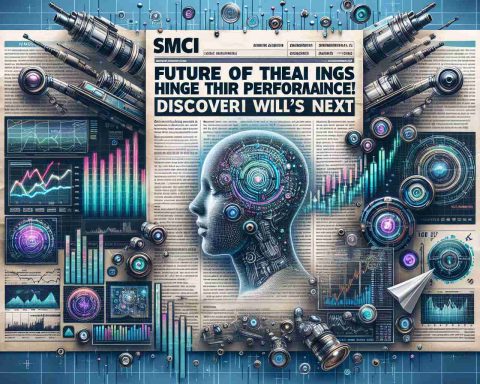Understanding the Quantum Tech Landscape
Quantum computing is on everyone’s lips, but is it truly ready to revolutionize our tech landscape? Recent developments have buoyed investor enthusiasm, especially after Google’s introduction of a new quantum chip named “Willow.” This innovation sparked a significant surge in stocks related to quantum technology, including notable players like IonQ and Rigetti Computing. However, the optimism was short-lived as stocks took a dive following cautionary remarks from Nvidia’s CEO, who emphasized that quantum solutions may be a long-term endeavor.
The Quantum Quandary
The crux of the matter lies in the uncertainty surrounding quantum computing’s practical applications. Experts are questioning whether there is a substantial consumer market for this technology at the moment. Despite a robust research environment, the broader retail market might not be ready to embrace quantum solutions just yet.
Technical Insights
Quantum computers utilize qubits, allowing them to process immense data in ways classical computers cannot. However, this advanced technology is not designed to replace everyday devices like laptops or smartphones anytime soon. The challenge lies in their complex architecture, which requires novel programming paradigms to leverage their potential fully.
The Future of Quantum Computing
While companies like Alphabet are well-positioned to explore quantum computing applications across diversified sectors, the road to widespread implementation remains fraught with uncertainties. Investors should keep a vigilant eye on this evolving landscape as quantum computing continues to oscillate between promise and practicality.
The Broader Implications of Quantum Technology
The emergence of quantum computing not only represents a technological milestone but also poses significant implications for society, culture, and the global economy. As this field advances, it is essential to consider how it might influence various sectors, including finance, healthcare, and cybersecurity. For instance, financial institutions could harness quantum algorithms for high-frequency trading, enabling them to process vast datasets with unparalleled speed and accuracy. This could lead to more efficient markets, but it might also create exacerbated inequalities as only those with access to quantum resources gain a competitive edge.
In terms of environmental impacts, quantum technology could play a pivotal role in optimizing energy usage and improving the efficiency of renewable energy sources. By simulating molecular interactions more accurately, quantum computing could revolutionize material science, leading to breakthroughs in battery technology and carbon capture methods. However, the energy consumption associated with quantum devices themselves raises concerns regarding their ecological footprint.
Looking towards the future, long-term significance lies in education and workforce development. As quantum technology matures, there will be a growing demand for skilled professionals adept in quantum algorithms and systems. This shift could lead to a redefined educational landscape, prompting universities and institutions to adapt curricula to cultivate a new generation of quantum-savvy individuals.
As we stand on the precipice of this quantum revolution, it is crucial for policymakers and industry leaders to foster a collaborative framework that balances innovation with ethical considerations, thereby ensuring that the benefits of this powerful technology are accessible to all segments of society.
Is Quantum Computing Ready for Prime Time? Unveiling the Future of Technology
The realm of quantum computing is rapidly evolving, prompting questions about its readiness to revolutionize the tech landscape. Recent advances, particularly Google’s introduction of the quantum chip named “Willow,” have stirred significant investor interest, driving stock prices for firms like IonQ and Rigetti Computing. However, the excitement witnessed was tempered by sobering perspectives from Nvidia’s CEO, highlighting the idea that quantum solutions might be a longer-term aspiration rather than an immediate reality.
Understanding Quantum Computing
Quantum computing leverages the principles of quantum mechanics, wherein qubits—the fundamental units of quantum information—enable processing capabilities far beyond traditional binary systems. Unlike classical bits, which exist in a state of 0 or 1, qubits can exist in multiple states simultaneously thanks to phenomena such as superposition and entanglement. This allows quantum computers to tackle complex problems that would be infeasible for classical computers.
Current Use Cases of Quantum Technology
While the technology is still in its nascent stages, there are promising applications in various sectors:
– Cryptography: Quantum computing could offer breakthroughs in encrypting and decrypting data, dramatically enhancing security protocols.
– Drug Discovery: Pharmaceutical companies are investigating quantum computing to simulate molecular interactions, significantly speeding up the discovery of new drugs.
– Financial Modelling: Quantum algorithms are being developed to optimize financial portfolios and assess risk with greater precision.
Pros and Cons of Quantum Computing
# Pros:
– Unmatched Speed: Quantum computers can solve specific problems exponentially faster than classical computers.
– Complex Problem Solving: Ideal for simulations in chemistry, physics, and materials science.
– Enhanced Security: Potential to create unbreakable encryption methods.
# Cons:
– Costly Infrastructure: Current quantum processors require significant investment and precise environmental conditions to function.
– Limited Applications: Many quantum computing applications are still theoretical or in early experimental stages.
– Complexity: Understanding and programming quantum computers requires expertise that is currently scarce.
Market Trends and Insights
Investment in quantum technology is expected to soar in the coming years, fueling innovation and research. According to recent market analyses, the global quantum computing market is projected to grow from a valuation of approximately $500 million to over $8 billion by 2027. This growth trajectory is largely driven by advancements in related technologies, including AI and machine learning, facilitating new use cases for quantum computers.
Limitations and Challenges Ahead
Despite its potential, quantum computing faces several challenges:
– Scalability: Current quantum systems lack the capability to scale efficiently, with most systems housing only a limited number of qubits.
– Error Rates: Quantum computations are susceptible to errors due to decoherence and noise, requiring sophisticated error correction.
– Skill Gap: There remains a notable lack of qualified professionals capable of developing software for quantum platforms, posing a barrier to widespread adoption.
Innovations in the Quantum Space
Companies worldwide are investing heavily in quantum technology research and development. Notable innovations include:
– Quantum Supremacy: Google claimed achievement of quantum supremacy with its Sycamore processor, performing a specific task more quickly than the best classical supercomputers.
– Quantum Networking: Research is underway to create secure quantum networks that leverage entangled particles for instantaneous communication.
Conclusion and Outlook
The future of quantum computing is marked by both excitement and caution. While the potential benefits are significant, practical applications remain elusive for the general consumer market. As research progresses and more investments pour into the sector, industry leaders expect to see breakthroughs that could redefine computational capabilities. However, potential investors should stay informed and approach the landscape with measured optimism.
To explore more about the groundbreaking developments in quantum technology, visit IBM Quantum Computing.



















